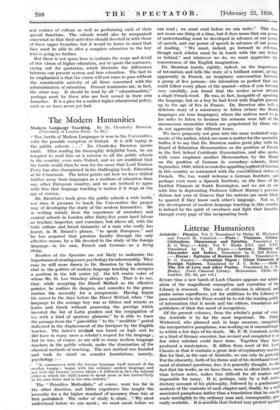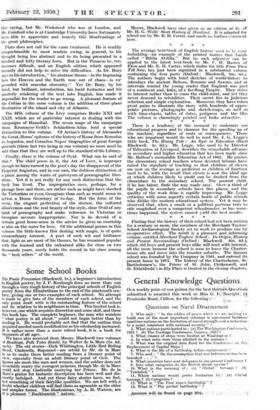Litterae Humattiores
EVERY time a new batch of Loeb Classics appears our admir- ation of the magnificent conception and execution of the Library is renewed. The voice of criticism is silenced, and praise seems superfluous, yet for additions to the Library to pass unnoticed in the Press would be to rob the reading public of information that it needs' and the editOrs, translators and publishers of their due meed of recognition.
Of the present volumes, from the scholar's point of view. the Aristotle is by far the most important. Dr. Philip Wielcsteed, who planned and, in large measure, completed the interpretative paraphrase, was working on it:unremittingly to within a few days of his death. Mr. F. M. Cornford, acting as a kind of literary executor, has revised and completed it ae few other scholars could have done. Together they have produced a masterpiece. It- differs from most of the Loeb' Classics in that it contains a great deal of explanatery matter. But for that, in the case of Aristotle, we can only be grateful. For the obscurity, both of his thethe find of his shorthand treat- ment of abstract questions, due, it is generally thought, to the fact that his works, as we have them, were in effect little more than lecture notes, makes him difficult for all readers and impossible for many. It perhaps, only by a' full intro- ductory account of his philosophy, followed by a preliminary analysis of the contents of each chapter and, finally, by a well annotated paraphrase rather than a translation that he can be made intelligible to the ordinary man and, consequently, gen' crony readable. It is possible that Oxford may protest against,
this saying, but Mr. Wieksteed who was at London, and Cornford who is at Cambridge University have fortunately been able to appreciate and remedy this elisadirantage of the great philosopher.
Plato does not call for the same treatment. He is readily compreheniible to most readers owing; in general; to his thought being less abstract and to its being presented in a finished and lofty literary form. But in the 'rimaeus he, too, becomes difficult, and an English edition which appeared recently did not help to solve the difficulties. As Dr. Bury says in his introduction, " his abstruse theme—in the beginning how the Heaven and the Earth rose out of chaos—is ex- pounded with oracular obscurity." Yet Dr. Bury, by his brief, but brilliant, introduction, his lucid footnotes and his masterly rendering of the text into English, has made it impossible for the reader to go wrong. A pleasant feature of the Critias in the same volume is the addition of three plans illustrative of the island and city of Atlantis.
The fifth volume of the Livy comprises Books XXI and XXII, which are of particular interest as dealing with the campaigns of Hannibal. The seven maps of the campaigns from Kromayer-Veith's Schlachten-Atlas lend a special* distinction to this volume. Of Arrian's history of Alexander' the Great, Horus' epitome of the history of Rome from Romulus to Augustus, and Cornelius Nepos' biographies of great foreign generals (these last two being in one volume) no more need be said than that they are well up to the standard of the Library.
Finally, there is the volume of Ovid. What can be said of. that ? The chief poem in it, the Art of Lhve, is improper enough tO.havelearned in the poet's day the disapproval of the FAllperbi Auiustus, and in our own, the dubious distinction of. a; plage among the wares Of pniveyors of pornographic liter ature. Yet it is not really for any such distinction that the. b1iok has lived. The improprieties save, perhaps, for a. passage here and there, are rather such as might have shocked. the Victorians or even Geengians than such as would. rouse to action a Home Secretary of to-day. But the form of the verse, the elegant perfection of the diction, the cultured, allusiveness and the real beauty of the style, clear Ovid of any. taint of pornography and make reference to Victorian or, Georgian savours inappropriate. Nor is he devoid of a, certain good horse-sense in the advice he gives on courtship; as also on the cures for love. Of the additional poems in this, volume the little-known Ibis dealing with magic, is of quite, extraordinary interest. ' A poet of such wit and brilliance that, light as are most of his themes, he has remained popular with the learned and the unlearned alike for close on two' thousands years, surely holds the record in his class among the " best sellers " 'of the world.











































 Previous page
Previous page